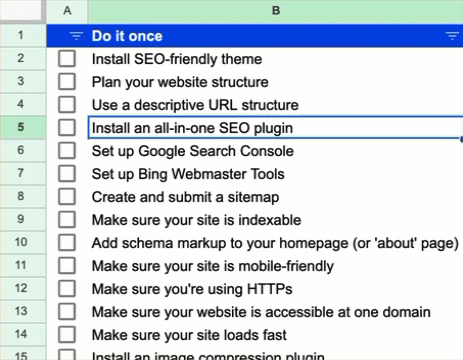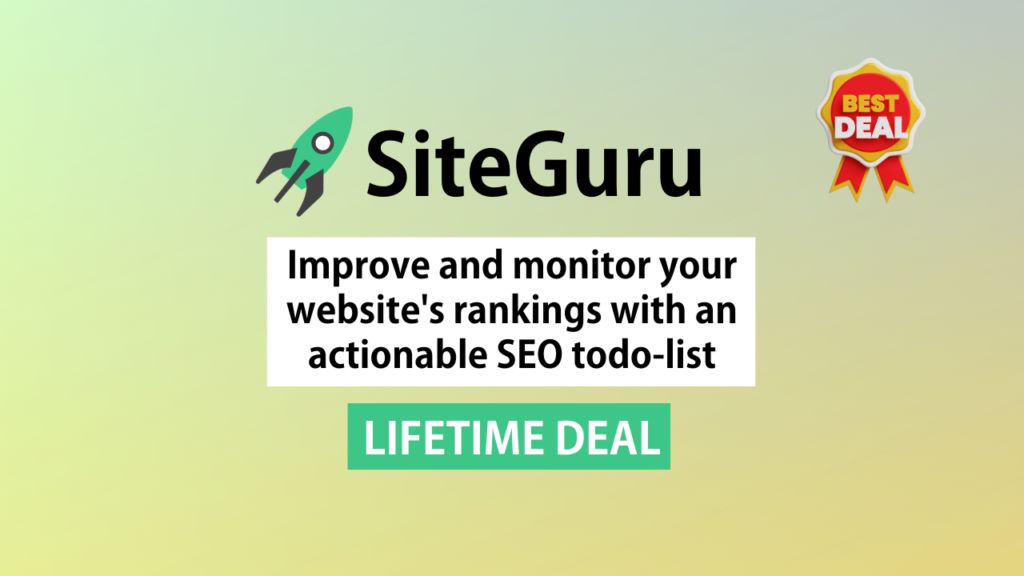SEO is crucial for improving your website’s visibility and driving organic traffic. But where do you start?
With the right actionable SEO to-do list, you can systematically improve your site’s performance and rankings. In this blog, we will explore the best actionable SEO to-do list to help you boost your website’s visibility. An organized SEO strategy not only saves time but also ensures you cover all critical aspects. From keyword research to on-page optimization, this guide will provide you with clear and practical steps. Whether you’re a beginner or an experienced professional, these tasks are designed to help you see tangible improvements in your search engine rankings. Ready to get started? Let’s dive into the essential SEO tasks that will transform your website’s performance. For a comprehensive SEO audit tool, check out SiteGuru.
Table of Contents
ToggleIntroduction To Actionable Seo To-do List
In the digital age, improving your website’s SEO is crucial for visibility and traffic. An actionable SEO to-do list can make a significant difference. It helps you stay organized and focused on tasks that will boost your rankings. SiteGuru is a tool that provides an efficient and comprehensive SEO audit, offering actionable to-do lists based on audit results.
Understanding The Importance Of Seo
Search Engine Optimization (SEO) is essential for any website aiming to attract organic traffic. SEO helps your site rank higher on search engines like Google. Higher rankings lead to more visibility, which can increase website traffic. This traffic often translates to more customers or readers.
SEO involves optimizing various aspects of your website. This includes keyword usage, meta descriptions, backlinks, and more. A well-optimized site is user-friendly, loads quickly, and provides valuable content. These factors contribute to better search engine rankings.
How A To-do List Can Simplify Your Seo Efforts
An actionable SEO to-do list breaks down complex SEO tasks into manageable steps. This makes it easier to tackle SEO without feeling overwhelmed. SiteGuru helps by providing clear, actionable steps based on your website’s SEO audit.
Here are some benefits of using an SEO to-do list with SiteGuru:
- Full SEO Audit: Identifies critical issues and provides a to-do list for improvement.
- SEO Performance Monitoring: Uses data from Google Search Console and Google Analytics.
- Keyword Ranking: Shows which keywords you can rank for and tracks changes in search results.
- Click-Through Rate Improvement: Offers suggestions to enhance click-through rates from Google.
By following these actionable steps, you can systematically improve your site’s SEO. This organized approach saves time and ensures no important task is overlooked.
| Plan | Price | Features |
|---|---|---|
| Plan 1 | $69 | Unlimited users, 1 website, up to 500 pages |
| Plan 2 | $138 | Unlimited users, 2 websites, up to 1,000 pages |
| Plan 3 | $207 | Unlimited users, 3 websites, up to 1,500 pages |
Using SiteGuru, you can improve your website’s SEO performance effortlessly. It works with any website platform and requires no installation. With regular automated weekly crawls, it keeps your site in top shape.
Keyword Research And Optimization
Effective keyword research and optimization are the cornerstones of any successful SEO strategy. Identifying the right keywords can drive targeted traffic to your website, improving visibility and engagement. In this section, we will explore three critical aspects of keyword research: identifying high-value keywords, using long-tail keywords for better targeting, and optimizing content for keywords.
Identifying High-value Keywords
Finding high-value keywords involves determining which search terms will bring the most benefit to your website. Use tools like SiteGuru to identify keywords that have a high search volume and low competition. Here are some steps to consider:
- Analyze your niche and audience.
- Use keyword research tools to gather data.
- Focus on keywords with high search volume and low competition.
- Consider user intent and relevance to your content.
Using SiteGuru’s keyword ranking feature can help track changes in search results, offering insights into which keywords are performing well.
Using Long-tail Keywords For Better Targeting
Long-tail keywords are longer and more specific search terms. They may have lower search volumes but often lead to higher conversion rates. Here’s why you should use long-tail keywords:
- They attract targeted traffic.
- They have less competition.
- They often indicate higher user intent.
For example, instead of targeting the broad keyword “SEO tools,” you could target “best SEO tools for small businesses.”
SiteGuru can assist you in identifying these long-tail keywords and incorporating them into your SEO strategy.
Optimizing Content For Keywords
Once you have identified your keywords, the next step is to optimize your content. Here are some tips to ensure your content is keyword-optimized:
- Include keywords in the title, meta description, and headers.
- Use keywords naturally throughout the content.
- Ensure keyword density is balanced and avoid keyword stuffing.
- Use related keywords and synonyms to enhance relevance.
SiteGuru’s SEO goals feature helps you optimize pages for key keywords, ensuring that your content aligns with your target search terms.
By following these steps, you can improve your website’s visibility and attract the right audience, leading to better engagement and higher conversion rates.
On-page Seo Techniques
On-page SEO is crucial for improving your website’s visibility and rankings. It involves optimizing individual web pages to rank higher and earn more relevant traffic. Below are actionable on-page SEO techniques to enhance your site’s performance.
Optimizing Title Tags And Meta Descriptions
Title tags and meta descriptions are vital for attracting clicks from search results. Ensure your title tags are unique and contain primary keywords. Keep them under 60 characters to avoid truncation. Meta descriptions should be compelling and concise, ideally between 150-160 characters.
| Element | Best Practices |
|---|---|
| Title Tags | Include primary keywords, keep under 60 characters |
| Meta Descriptions | Be compelling, keep between 150-160 characters |
Improving Url Structures
URLs should be clean, descriptive, and easy to read. Avoid using special characters and excessive numbers. Include keywords in your URLs to improve relevancy.
- Use hyphens to separate words
- Keep URLs short and descriptive
- Avoid special characters and numbers
Using Header Tags Effectively
Header tags (H1, H2, H3, etc.) help structure your content and improve readability. Use only one H1 tag per page and include primary keywords. Use H2 and H3 tags to break down sections and include secondary keywords.
- Use one H1 tag per page
- Include primary keywords in H1
- Use H2 and H3 tags for subheadings
- Include secondary keywords in subheadings
Enhancing Content Quality And Readability
Quality content is key to engaging users and improving SEO. Focus on creating valuable, informative, and easy-to-read content. Use short paragraphs, bullet points, and visuals to break up text and enhance readability.
Here are some tips for improving content quality:
- Write in a clear, concise manner
- Use short sentences and paragraphs
- Incorporate bullet points and lists
- Include images and videos to support text
By following these on-page SEO techniques, you can significantly improve your website’s rankings and user experience.

Credit: rhrasel.com
Technical Seo Checklist
Optimizing technical SEO is crucial for improving your website’s performance and visibility. A well-structured technical SEO checklist ensures your site is user-friendly, secure, and fast. Below are key areas to focus on:
Ensuring Mobile-friendliness
With more users accessing websites via mobile devices, ensuring mobile-friendliness is essential. Google prioritizes mobile-friendly sites in search results. Use Google’s Mobile-Friendly Test to check your site’s compatibility.
- Use responsive design
- Optimize images and media
- Avoid flash and pop-ups
Ensure your text is readable without zooming, and that buttons and links are easily clickable.
Improving Site Speed
Site speed affects user experience and search rankings. Slow-loading sites lead to higher bounce rates. Use tools like Google PageSpeed Insights to analyze and improve your site speed.
- Compress images and files
- Minimize HTTP requests
- Enable browser caching
Consider using a Content Delivery Network (CDN) to enhance load times globally.
Fixing Broken Links
Broken links can harm user experience and SEO. Regularly check and fix broken links using tools like SiteGuru’s SEO audit.
| Issue | Solution |
|---|---|
| 404 errors | Redirect to relevant pages |
| Broken images | Update or remove images |
Ensure all internal and external links are functional.
Implementing Ssl For Security
Security is crucial for user trust and SEO. Implementing SSL ensures that your website is secure and ranks better in search results.
- Purchase and install an SSL certificate
- Update internal links to HTTPS
- Set up 301 redirects from HTTP to HTTPS
Check the SSL status using online tools to ensure proper installation.
Off-page Seo Strategies
Off-page SEO is crucial for improving your website’s authority and search engine ranking. It involves activities that occur outside your website but significantly impact your site’s visibility. Here are some actionable strategies you can implement to boost your off-page SEO.
Building Quality Backlinks
Building quality backlinks is a key part of off-page SEO. Backlinks from reputable sites can boost your site’s credibility and rank.
- Focus on getting links from high-authority domains.
- Ensure the links are relevant to your content.
- Avoid spammy or low-quality links as they can harm your SEO.
Tools like SiteGuru can help identify opportunities for quality backlinks by analyzing your site’s current link profile.
Utilizing Social Media For Seo
Social media platforms can drive traffic to your website and improve your SEO.
- Share your content regularly on social media channels.
- Engage with your audience to build a loyal following.
- Use social media to connect with influencers and industry leaders.
SiteGuru’s insights dashboard can track how social media efforts impact your site’s organic performance.
Guest Blogging And Outreach
Guest blogging is a great way to build backlinks and reach a wider audience.
- Identify blogs in your niche that accept guest posts.
- Pitch relevant and valuable content ideas to them.
- Include a link back to your site in your author bio or within the content.
Outreach involves reaching out to website owners and influencers to promote your content and build relationships. SiteGuru can assist in tracking the effectiveness of these outreach efforts by monitoring your keyword rankings and search results changes.

Credit: ahrefs.com
Local Seo Tips
Local SEO is crucial for businesses that serve specific geographic areas. Enhancing your local SEO can attract more local customers and improve your online visibility. Below are some actionable tips to improve your local SEO.
Optimizing For Google My Business
Creating and optimizing your Google My Business (GMB) profile is essential. Follow these steps:
- Claim your business listing on Google My Business.
- Fill out all the information fields accurately.
- Add high-quality photos of your business.
- Choose the correct business categories.
- Ensure your business hours are up-to-date.
- Include a detailed business description with relevant keywords.
Having a well-optimized GMB profile helps your business appear in local search results and on Google Maps.
Encouraging Customer Reviews
Customer reviews play a significant role in local SEO. Positive reviews can boost your rankings and attract more customers. Here are some tips to encourage reviews:
- Ask satisfied customers to leave a review.
- Make it easy for customers by providing direct links to your review pages.
- Respond to all reviews, both positive and negative.
- Offer excellent customer service to encourage positive feedback.
- Display review badges and widgets on your website.
Engaging with customer reviews shows that you value feedback and helps build trust with potential customers.
Local Keyword Targeting
Targeting local keywords is vital for local SEO. Here’s how you can do it:
- Use keyword research tools to find local keywords relevant to your business.
- Include these keywords in your website’s meta tags, titles, and descriptions.
- Incorporate local keywords naturally in your website’s content.
- Optimize your website’s URL structure with local keywords.
- Write blog posts about local events or news related to your business.
Targeting local keywords can improve your website’s visibility in local search results, driving more traffic from your specific area.
Using tools like SiteGuru can help you identify and implement these local SEO strategies effectively. SiteGuru offers a comprehensive SEO audit and actionable to-do lists, simplifying the optimization process for both beginners and experienced professionals.
Get SiteGuru today and start improving your website’s SEO performance effortlessly! Visit SiteGuru
Measuring And Analyzing Seo Performance
Understanding your SEO performance is crucial for improving your website’s visibility. By measuring and analyzing, you can see what’s working and what needs improvement. Here’s how you can effectively measure and analyze your SEO performance using various tools and techniques.
Using Google Analytics For Seo Insights
Google Analytics is a powerful tool for gaining insights into your website’s SEO performance. It helps track various metrics such as:
- Organic traffic
- Bounce rate
- Average session duration
- Pages per session
To utilize Google Analytics, follow these steps:
- Set up a Google Analytics account.
- Integrate it with your website.
- Monitor key metrics and create custom reports.
SiteGuru simplifies this process by integrating with Google Analytics, providing clear and actionable insights.
Tracking Keyword Rankings
Tracking keyword rankings is essential for understanding which keywords drive traffic to your site. Using SiteGuru, you can monitor:
- Keyword positions
- Changes in rankings
- New keyword opportunities
To track keyword rankings:
- Identify your target keywords.
- Use SiteGuru to monitor these keywords.
- Adjust your SEO strategy based on the ranking data.
Regularly Auditing Your Website
Regular SEO audits are essential for maintaining optimal website performance. SiteGuru offers a comprehensive SEO audit that identifies critical issues and provides an actionable to-do list.
| Audit Feature | Description |
|---|---|
| Full SEO Audit | Identifies and highlights critical SEO issues. |
| SEO Performance Monitoring | Uses data from Google Analytics and Google Search Console. |
| Automated Weekly Crawls | Regular checks for SEO issues. |
To conduct regular audits:
- Set up SiteGuru for your website.
- Review the audit reports.
- Implement the recommended actions.
By following these steps, you can ensure your website remains optimized and competitive in search engine rankings.
Conclusion And Next Steps
In this guide, we have explored how to use SiteGuru to improve your website’s SEO. SiteGuru offers a comprehensive SEO audit, actionable to-do lists, and performance monitoring, making it an ideal tool for both beginners and experts.
Recap Of Key Points
- Full SEO Audit: SiteGuru identifies critical SEO issues and provides a clear to-do list for improvement.
- SEO Performance Monitoring: Uses Google Search Console and Google Analytics data to track your site’s SEO performance.
- Keyword Ranking: Shows which keywords you can rank for and monitors changes in search results.
- Click-Through Rate Improvement: Offers suggestions to enhance your click-through rates from Google.
- Unlimited Users: You can invite clients and colleagues to collaborate on your SEO tasks.
- SEO Goals: Helps you optimize pages for key keywords.
Implementing Your Seo To-do List
Follow these steps to start implementing your SEO to-do list:
- Log in to SiteGuru and run a full SEO audit on your website.
- Review the to-do list generated by the audit results.
- Prioritize tasks based on their impact on your SEO performance.
- Assign tasks to team members if you have collaborators.
- Use the insights dashboard to track your progress over time.
- Make use of the weekly crawls to stay updated on any new SEO issues.
By consistently working through these tasks, you can significantly improve your website’s SEO performance.
Staying Updated With Seo Trends
SEO is a constantly evolving field. It’s important to stay updated with the latest trends. Here are some tips:
- Subscribe to reputable SEO blogs and newsletters.
- Join SEO communities and forums to share knowledge and insights.
- Attend SEO webinars and conferences to learn from experts.
- Regularly review Google’s updates and guidelines.
- Use SiteGuru’s automated weekly crawls to keep your SEO strategy up to date.
By staying informed, you can ensure your SEO strategy remains effective and aligned with current best practices.

Credit: www.instagram.com
Frequently Asked Questions
What Is An Seo To-do List?
An SEO to-do list is a structured plan. It helps optimize your website for search engines. It includes actionable tasks for better rankings.
Why Is Keyword Research Important?
Keyword research identifies phrases your audience searches for. It helps target the right keywords. This boosts your website’s visibility.
How Often Should I Update My Seo To-do List?
Update your SEO to-do list regularly. Monthly reviews are ideal. This ensures your strategies remain effective and up-to-date.
What Are Actionable Seo Tasks?
Actionable SEO tasks are specific actions. They include keyword optimization, content creation, and link building. Each task directly improves your SEO performance.
Conclusion
Wrapping up, a solid SEO to-do list boosts your website’s visibility. Focus on key tasks and monitor results regularly. Using tools like SiteGuru can simplify the process. SiteGuru offers actionable insights and easy-to-follow steps for all skill levels. Ready to improve your SEO? Check out SiteGuru for a comprehensive solution. Remember, consistent effort leads to better rankings and increased traffic. Start optimizing today for long-term success. Thank you for reading!
Related posts:
No related posts.





